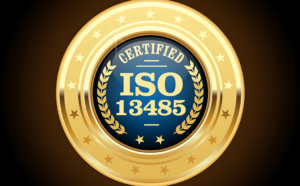I. Introduction to ISO 13485 Internal Auditor Training
A. What is ISO 13485?
ISO 13485 is an international standard that specifies requirements for a quality management system (QMS) in the medical device industry. It focuses on ensuring that medical devices meet regulatory requirements and perform effectively throughout their lifecycle. The standard covers various aspects of quality management, including design, development, production, and post-market activities. ISO 13485 is essential for organizations involved in medical devices and related services, as it helps ensure the safety, effectiveness, and quality of their products. Adhering to ISO 13485 not only helps in meeting regulatory requirements but also enhances overall product quality and customer satisfaction.
II. Objectives of ISO 13485 Internal Auditor Training
A. Developing Skills for Effective Internal Auditing
ISO 13485 internal auditor training focuses on equipping individuals with the essential skills required for conducting effective internal audits. Trainees learn to plan, execute, and report on audits, ensuring that they can identify and assess compliance with ISO 13485 requirements. The training emphasizes developing analytical skills to evaluate processes, interpret documentation, and recognize non-conformities. Additionally, participants gain practical experience through simulated audits and case studies, enhancing their ability to address issues and recommend improvements. By honing these skills, internal auditors can contribute significantly to the overall effectiveness of the quality management system and support the organization’s commitment to quality and regulatory compliance.
B. Understanding the Role of Internal Auditors in QMS
A key objective of ISO 13485 internal auditor training is to provide a thorough understanding of the role of internal auditors within the quality management system (QMS). Auditors are pivotal in evaluating the performance of the QMS, ensuring that it meets the requirements of ISO 13485 and effectively manages quality across all processes. Training covers the responsibilities of auditors, including planning and conducting audits, documenting findings, and following up on corrective actions. By understanding their role, auditors can better contribute to maintaining a compliant and efficient QMS, ultimately supporting the organization in delivering high-quality medical devices and services.
III. Core Components of ISO 13485 Internal Auditor Training
A. Overview of ISO 13485 Auditing Principles
ISO 13485 internal auditor training begins with a comprehensive overview of auditing principles tailored to the medical device industry. This foundation includes understanding the objectives and scope of internal audits within the context of ISO 13485. Trainees learn about the key principles of auditing, such as impartiality, confidentiality, and evidence-based evaluation. The training covers the systematic approach required for auditing, including criteria for assessing compliance and identifying non-conformities. By grasping these principles, auditors are better equipped to conduct thorough and objective audits, ensuring that the quality management system adheres to the required standards and effectively supports the organization’s quality objectives.
B. Planning and Conducting Internal Audits
Effective planning and execution of internal audits are critical components of ISO 13485 internal auditor training. Trainees learn how to develop detailed audit plans that outline the scope, objectives, and criteria for each audit. The training emphasizes the importance of selecting appropriate audit methods and preparing checklists to guide the audit process. Participants also gain skills in conducting audits, including interviewing staff, examining documentation, and observing processes. Proper execution involves maintaining consistency and objectivity while evaluating the effectiveness of the quality management system. By mastering these skills, internal auditors can identify areas for improvement and ensure that the organization remains compliant with ISO 13485 standards.
C. Techniques for Effective Audit Reporting
The ability to report audit findings clearly and effectively is a crucial aspect of ISO 13485 internal auditor training. Trainees learn techniques for documenting and presenting audit results in a structured and comprehensive manner. This includes drafting detailed reports that highlight findings, evidence, and any non-conformities discovered during the audit. The training also covers best practices for communicating recommendations and corrective actions to relevant stakeholders. Effective audit reporting helps ensure that issues are addressed promptly and that the quality management system continues to improve. By mastering these reporting techniques, internal auditors contribute to ongoing compliance and support the organization’s commitment to maintaining high standards in medical device quality management.
IV. Benefits of ISO 13485 Internal Auditor Training
A. Improved Understanding of ISO 13485 Standards
ISO 13485 internal auditor training significantly enhances participants’ understanding of the standards and their application in the medical device industry. Through focused education on ISO 13485 requirements, auditors gain a deep comprehension of the principles and practices necessary for maintaining compliance. This knowledge is crucial for evaluating the quality management system’s effectiveness and ensuring that all processes adhere to regulatory expectations. A thorough grasp of these standards enables auditors to conduct more precise and insightful audits, ultimately helping the organization meet both internal and external quality requirements effectively.
B. Enhanced Skills in Identifying and Addressing Non-Conformities
Training for ISO 13485 internal auditors sharpens their ability to detect and address non-conformities within the quality management system. By learning advanced auditing techniques and best practices, auditors become adept at identifying discrepancies and areas where processes do not meet the standard’s requirements. This skill set includes recognizing potential risks and areas for improvement, as well as recommending appropriate corrective actions. Enhanced abilities in identifying and addressing non-conformities lead to more effective audits and help ensure that the quality management system continually evolves to meet high standards of quality and compliance.
C. Increased Ability to Contribute to QMS Improvement
ISO 13485 internal auditor training equips participants with the skills needed to contribute meaningfully to the improvement of the quality management system (QMS). With a solid understanding of auditing principles and effective reporting techniques, auditors can provide valuable insights and recommendations for enhancing system performance. Their expertise helps in identifying systemic issues and proposing solutions that drive continuous improvement. As a result, internal auditors play a crucial role in refining processes, boosting overall quality, and ensuring that the organization consistently meets ISO 13485 standards. This proactive contribution supports the organization’s commitment to delivering high-quality medical devices and maintaining regulatory compliance.
V. Advanced Topics in ISO 13485 Internal Auditing
A. Der standing Risk-Based Auditing Approaches
Advanced training in ISO 13485 internal auditing introduces risk-based auditing approaches, which focus on prioritizing audit activities based on the level of risk associated with different areas of the quality management system. Auditors learn to assess the potential impact of risks on product quality and patient safety, allowing them to allocate audit resources more effectively. This approach involves identifying high-risk areas, evaluating the controls in place, and concentrating audit efforts on areas with the greatest potential for non-compliance or process failure.By adopting risk-based auditing techniques, auditors can provide more targeted and valuable insights, helping the organization address critical issues and maintain high standards of quality and safety.
B. Integrating Risk Management into Internal Audits
Incorporating risk management principles into internal audits is another advanced topic covered in ISO 13485 training. This involves embedding risk assessment and mitigation strategies into the audit process to better align with the organization’s overall risk management framework.Auditors learn how to evaluate the effectiveness of existing risk management controls, identify gaps, and recommend improvements.Integrating risk management into audits ensures that potential risks are addressed proactively and that the quality management system remains robust and responsive to emerging threats.This approach enhances the ability of internal audits to contribute to the organization’s risk management efforts and supports the continuous improvement of processes and controls.
VI. Conclusion
A. Recap of the Importance of ISO 13485 Internal Auditor Training
ISO 13485 internal auditor training is essential for ensuring the effectiveness and compliance of a quality management system within the medical device industry. By providing auditors with a deep understanding of ISO 13485 standards, the training helps them conduct thorough and objective audits. This process is crucial for identifying non-conformities, assessing compliance, and recommending improvements. Properly trained internal auditors play a pivotal role in maintaining high standards of product quality and regulatory adherence. Their expertise contributes to the overall success of the quality management system, helping organizations uphold their commitment to quality and safety in their medical device offerings.



